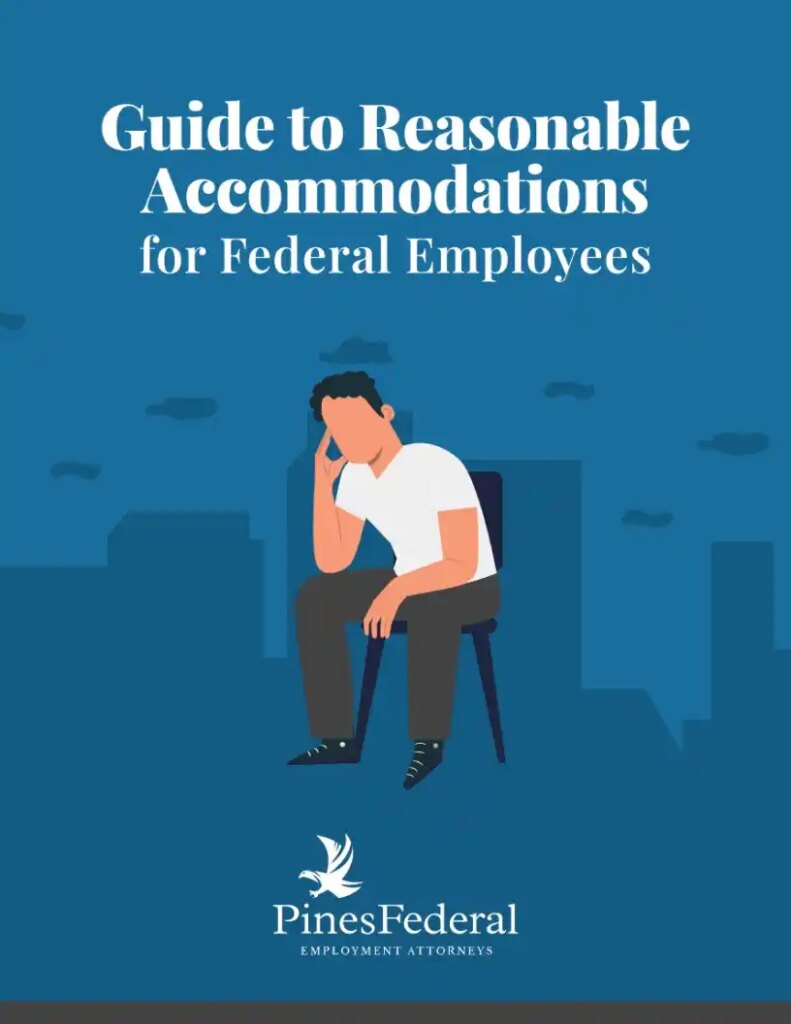Working from Home as a Reasonable Accommodation

More employees in both the public and private sectors are working from home than ever before. This is of course in large part due to ongoing concerns about COVID-19 and the closure of many offices categorized as nonessential. But the seismic shift in how we conduct work is transforming how we perceive the office environment and potentially revealing new efficiencies.
Federal employees living with disabilities may well already be aware of the challenges of navigating workplaces and office environments that are often not designed with their needs and abilities in mind.
For many, this extended period of telework represents a breath of fresh air, and as we look to what comes next after the pandemic ends, some might wonder if there are any means of facilitating a permanent pivot to working from home.
The good news is that qualifying employees with disabilities likely have the option and right to request teleworking as a reasonable accommodation from their federal agency.
So, is remote work a reasonable accommodation for you? It might be.
Below, our EEOC reasonable accommodations lawyers cover the relevant laws and how interested employees can explore the possibility. Learn how we can assist you by calling (800) 801-0598 or filling out our online form today.

“I was so pleased working with Pines Federal. I had peace of mind knowing I would not have to deal with the federal agency and all was taken care of by Pines. They are professional and responsive. I was very happy with the outcome of my case. Hiring Pines was the best decision I made.”
What Constitutes a Reasonable Accommodation?
Under the Rehabilitation Act of 1973, all federal agencies of the United States government must comply with the terms of the Americans with Disabilities Act (ADA), the framework of laws that protect the rights of differently-abled workers. Under these laws, federal agencies are required to provide reasonable accommodations to employees with qualifying disabilities.
A reasonable accommodation can and should:
- Help a prospective employee apply for a federal position,
- Facilitate the performance of an employee’s job duties, and
- Allow the employee to better enjoy the opportunities that come with employment.
Given these broad mandates, reasonable accommodations can take many forms in practice, including:
- Altering the physical makeup or layout of a workspace (to better allow persons with disabilities to navigate and perform job duties),
- Restructuring of job duties (including the reassignment of certain tasks a person with a disability cannot readily perform),
- Adjustment of work schedules or work location (such as moving an employee to a more accessible office),
- Extended leave or reduced schedules (including leaves permitted by the Family Medical Leave Act),
- Replacement or procurement of hardware or equipment (including specialized tools that allow persons with disabilities to more efficiently work), and
- Hiring of interpreters or readers to help facilitate any necessary translations or dictations.
Among these common reasonable accommodations is the reassignment of an individual with disabilities to an alternate work location. This can include the possibility of “telecommuting,” or working from home.
Your Employer Does Not Have to Make an Accommodation That Is an Undue Hardship
Is remote work a reasonable accommodation? It is if it doesn’t constitute an undue hardship. And what is an undue hardship? The ADA defines an undue hardship as a circumstance that causes significant expense or difficulty for an employer.
There are no hard and fast rules to determine when an accommodation is too expensive or difficult to require of an employer.
Instead, federal law looks at the following factors to decide whether an accommodation is reasonable:
- The nature of the employer’s operations,
- The nature of the accommodation,
- The size of the employer,
- The employer’s budget, and
- The cost of the accommodation.
Judges and officials of the U.S. Equal Employment Opportunity Commission (EEOC, which enforces the ADA) make their decisions about what is reasonable on a case-by-case basis. And knowing the above factors can help you negotiate or argue for a more favorable outcome after a work from home ADA accommodation request. Understanding attitudes toward remote work can also help you argue your case, so let’s look at those next.
How Attitudes Toward Teleworking Have Changed
Long before the pandemic began, “working from home” was often considered a privilege, one that was not commonly granted in many workplaces that prioritized in-person communication. Technology has rapidly advanced, however, vastly expanding what an employee can accomplish remotely.
With the advent of seamless video teleconferencing, shared online databases, and other internet workplace tools, teleworking has emerged as a viable alternative to being physically present in a workplace. Working from home has even been shown to improve employee productivity and morale in some workplaces.
Given the extent of technology now available, what can be accomplished via teleworking is now often indistinguishable from what can be accomplished in-person. This phenomenon culminated in The Telework Enhancement Act, which codifies federal guidelines for providing telework options for employees with qualifying disabilities. This is an important factor when considering teleworking as a reasonable accommodation, as federal agencies can potentially reject accommodations that represent an undue hardship.
Featured Case Result
WHAT HAPPENED: We negotiated a $100,00 settlement, back pay, restoration of leave, and transfer for a medical professional who was denied telework for her disability after the Agency returned to on-onsite work.
How Teleworking Qualifies as a Reasonable Accommodation
Luckily, whether teleworking is considered a reasonable accommodation is no longer up for debate as a result of the aforementioned Telework Enhancement Act. Employees with disabilities could already potentially be reassigned to an alternate work location more accommodating to their needs as a form of reasonable accommodation.
Teleworking is effectively the same practice in that it reassigns an employee to their home. This can help them avoid any complications related to daily transportation or inaccessible office spaces.
Many federal agencies have adopted teleworking policies prior to the pandemic and independent of any reasonable accommodation requirements. In other words, they have teleworking opportunities for employees with and without disabilities. Agencies with these programs in place will likely more readily, immediately, and efficiently accommodate those with disabilities requesting to work remotely. However, even if an agency does not have an existing telework program, a qualifying person with disabilities is still entitled to request the practice as a reasonable accommodation.
Potential Obstacles to Telework as a Reasonable Accommodation
It should be understood that not all jobs are practical candidates for telework. Some positions may have job responsibilities that inherently must be completed in person at a worksite and cannot be facilitated remotely. In these situations, teleworking may not be the obvious choice for reasonable accommodation.
With that said, providing reasonable accommodation can require multiple adjustments on the part of an agency. If, for example, only a single component of a disabled person’s job responsibilities necessitates in-person work, that task could potentially be reassigned – and the disabled person’s job restructured – to accommodate telework.
If a job fundamentally and predominantly requires in-person work that can no longer readily be completed by a person with a disability, another reasonable accommodation may be to be reassigned entirely to a different but similar position. From there, the new position could potentially include telework as a more practical and reasonable accommodation.
Benefits of Teleworking for Disabled Employees
Many benefits of telework are now obvious to a great deal of the United States population. You do not have to deal with your commute, worry about getting your lunch, or suffer from office distractions.
For many persons living with disabilities, the benefits of teleworking can grow exponentially. When disabilities make mobility difficult, not having to negotiate and navigate transportation twice a day can represent an incredible boon. Disabled employees will not have to struggle to move through a workspace not necessarily designed to suit their needs. By being allowed to work in their space, on their terms, productivity and enthusiasm are likely to increase.
Even better, many federal agencies have the support of The Department of Defense’s Computer/Electronic Accommodations Program (CAP). This division specifically exists to support persons with disabilities who elect to telework as a reasonable accommodation by supplying and installing all of the necessary work equipment needed to conduct job responsibilities from home. CAP also facilitates the training of employees using the supplied equipment and integration into the agency’s existing systems.
How Can I Convince My Employer to Grant My Remote Work Request?
You have the law on your side when requesting part-time or full-time telework as a reasonable accommodation. But your legal protections are not absolute. As we stated above, an employer can deny your request if the accommodation would cause an undue hardship. And your employer does not have to provide you with the exact accommodation you request. With all of this in mind, we review below how employers typically grant accommodations and how you can use ADA procedures to your benefit.
The Interactive Process and How to Prepare for It
In general, when you request an accommodation, you and your boss must engage in an “interactive process” to address your request. During the interactive process, the employer and employee collaborate to figure out which accommodations the employee should receive.
An experienced federal employment attorney from Pines Federal can help you gather the information you need and make the right arguments to show your employer that telework is the best option for you and the workplace.
You can also do the following to increase your chances of working remotely:
- Understand all the details of your job description and your day-to-day duties so that you have a good idea of whether any part of your job must be done in person;
- Understand the nature of your employer’s operations and major and minor needs so that you can understand how much your telework might affect your employer;
- Understand (and have documentation regarding) your disability-related limitations and how telework would eliminate or alleviate them;
- Understand your legal rights and options under the ADA;
- Understand your employer’s workforce size and financial resources so that you can give accurate pushback if your employer claims that telework is too costly or difficult; and
- Research other accommodations so that you can discuss why your request for telework is the better option.
Taking the actions we listed above can help ensure that your employer does not “bulldoze” you during the interactive process. Taking these actions can also help your employer understand why granting your ADA work from home request is in everyone’s best interest.
Understanding and Identifying Potential Costs of Other Accommodations
Proving that other accommodations would be more expensive, more difficult, or less effective could clinch you a telework accommodation. For example, showing your employer the cost of retrofitting workspaces with ramps, handrails, and assistive technology that you already have at home might prove to your employer that keeping you on site is less reasonable than allowing you to work from home.
We have decades of combined experience in arguing for accommodations for federal employees. So we can compile a comprehensive list of the accommodations you could receive and how they compare to telework. We can also assert all your federal employment rights.
What If I Was Denied a Reasonable Accommodation to Work from Home?
If your employer refuses telework as a reasonable accommodation, you may have the option to request a reconsideration. This request is internal, and you might come to an agreement through informal dispute resolution. But if you and your employer cannot agree, you can file a formal discrimination charge with the EEOC. You have 45 days from the date of discrimination to initiate the formal process with an EEO Officer. We can timely file your charge and maximize any legal relief that you deserve.
We Can Help You Pursue Telework as a Reasonable Accommodation
Post COVID-19, working remotely has become a fairly accepted practice for all types of employees. Given the systems in place to support the pivot, many federal agencies are already prepared and willing to support reasonable accommodations for telework. In the unlikely event that there is no means of reasonably accommodating your telework request, you may instead be eligible for FERS disability retirement benefits.
Our federal employment lawyers at Pines Federal have over 60 years of combined experience assisting clients seeking reasonable accommodations for their disabilities. We are familiar with how agencies evaluate and adjudicate these requests and can advocate on your behalf. Our team understands the inherent value of working from home and can work with you to procure the reasonable accommodations you need.
If you need assistance requesting reasonable accommodations of any kind, call (800) 801-0598 or contact us online to schedule a consultation.
[DOWNLOAD] Reasonable Accommodations for Federal Employees
